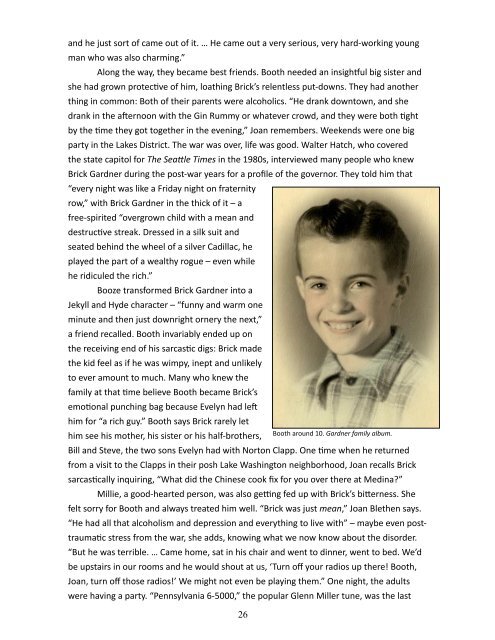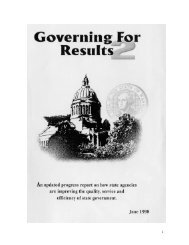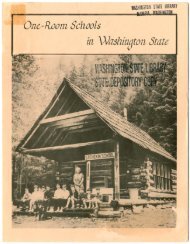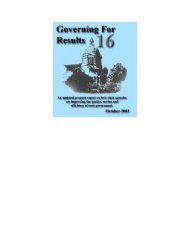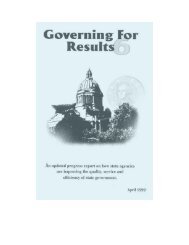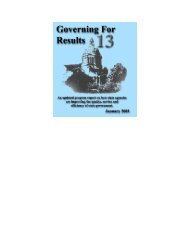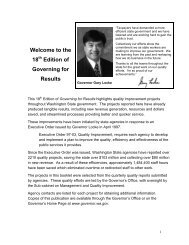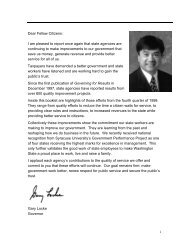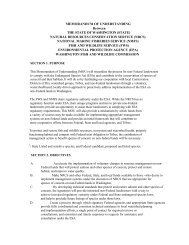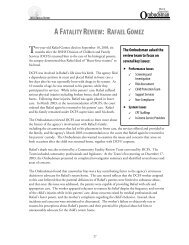BOOTH WHO? - Washington State Digital Archives
BOOTH WHO? - Washington State Digital Archives
BOOTH WHO? - Washington State Digital Archives
Create successful ePaper yourself
Turn your PDF publications into a flip-book with our unique Google optimized e-Paper software.
and he just sort of came out of it. … He came out a very serious, very hard-working young<br />
man who was also charming.”<br />
Along the way, they became best friends. Booth needed an insightful big sister and<br />
she had grown protective of him, loathing Brick’s relentless put-downs. They had another<br />
thing in common: Both of their parents were alcoholics. “He drank downtown, and she<br />
drank in the afternoon with the Gin Rummy or whatever crowd, and they were both tight<br />
by the time they got together in the evening,” Joan remembers. Weekends were one big<br />
party in the Lakes District. The war was over, life was good. Walter Hatch, who covered<br />
the state capitol for The Seattle Times in the 1980s, interviewed many people who knew<br />
Brick Gardner during the post-war years for a profile of the governor. They told him that<br />
“every night was like a Friday night on fraternity<br />
row,” with Brick Gardner in the thick of it – a<br />
free-spirited “overgrown child with a mean and<br />
destructive streak. Dressed in a silk suit and<br />
seated behind the wheel of a silver Cadillac, he<br />
played the part of a wealthy rogue – even while<br />
he ridiculed the rich.”<br />
Booze transformed Brick Gardner into a<br />
Jekyll and Hyde character – “funny and warm one<br />
minute and then just downright ornery the next,”<br />
a friend recalled. Booth invariably ended up on<br />
the receiving end of his sarcastic digs: Brick made<br />
the kid feel as if he was wimpy, inept and unlikely<br />
to ever amount to much. Many who knew the<br />
family at that time believe Booth became Brick’s<br />
emotional punching bag because Evelyn had left<br />
him for “a rich guy.” Booth says Brick rarely let<br />
him see his mother, his sister or his half-brothers,<br />
Booth around 10. Gardner family album.<br />
Bill and Steve, the two sons Evelyn had with Norton Clapp. One time when he returned<br />
from a visit to the Clapps in their posh Lake <strong>Washington</strong> neighborhood, Joan recalls Brick<br />
sarcastically inquiring, “What did the Chinese cook fix for you over there at Medina?”<br />
Millie, a good-hearted person, was also getting fed up with Brick’s bitterness. She<br />
felt sorry for Booth and always treated him well. “Brick was just mean,” Joan Blethen says.<br />
“He had all that alcoholism and depression and everything to live with” – maybe even posttraumatic<br />
stress from the war, she adds, knowing what we now know about the disorder.<br />
“But he was terrible. … Came home, sat in his chair and went to dinner, went to bed. We’d<br />
be upstairs in our rooms and he would shout at us, ‘Turn off your radios up there! Booth,<br />
Joan, turn off those radios!’ We might not even be playing them.” One night, the adults<br />
were having a party. “Pennsylvania 6-5000,” the popular Glenn Miller tune, was the last<br />
26


